Answer these simple questions and we will find you the BEST prices
Which type of solar quotes do you need?
It only takes 30 seconds
100% free with no obligation

Get up to 4 quotes from our selected suppliers by filling in only 1 form

Save money by comparing quotes and choosing the most competitive offer

Our service is 100% free and with no obligation
- Market-Inspector.co.uk
- Telephone Systems
- VoIP Phone
- Best SIP Phone
How To Find The Best SIP Phone For Business

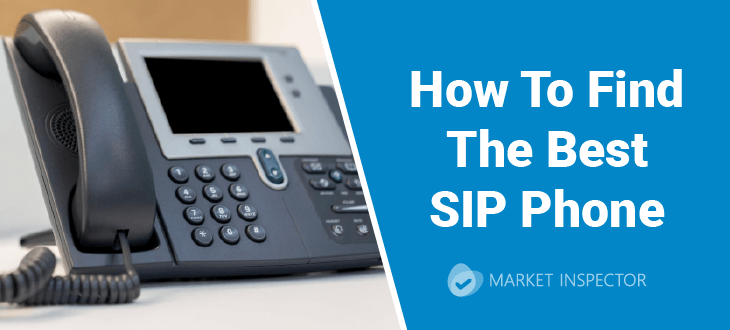
- SIP is a protocol part of the broader VoIP framework, offering advanced features and scalability.
- SIP hardware consists of desk phones, cordless phones, and conference models, each providing high-definition audio and advanced call management features.
- SIP trunks and lines provide scalable solutions for expanding businesses, delivering significant savings on long-distance and international calls.
Finding the best SIP (Session Initiation Protocol) phone for your business is crucial for ensuring efficient and cost-effective communication.
As businesses increasingly transition to VoIP (Voice over Internet Protocol) systems, SIP phones have become essential for facilitating seamless voice and video calls.
With many available options, selecting the right SIP phone can be daunting. This guide will walk you through the key factors to consider, from understanding your business needs and evaluating features to comparing top models and brands.
Whether you are a small startup or a large enterprise, this article will equip you with the knowledge to make an informed decision, ensuring your business benefits from the best communication technology available.
Seeking professional assistance is crucial when selecting the best SIP phone for your business. Market Inspector offers free access to expert help.
Fill out our quick form to receive four complimentary quotes from professionals with in-depth knowledge of SIP phones. Click below to find out more.
- Describe your needs
- Get free quotes
- Choose the best offer
It only takes 30 seconds

Understanding what a SIP line is
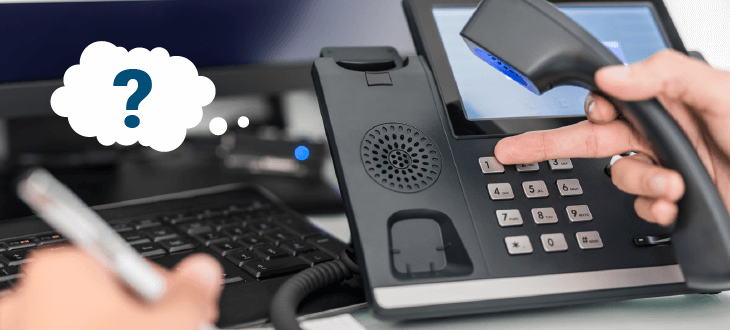
SIP phones, or Session Initiation Protocol phones, are Voice over Internet Protocol (VoIP) phones that use the SIP protocol to initiate, manage, and terminate voice and video calls over the Internet. This technology allows businesses to integrate voice, video, fax, and messaging into their communication systems.
SIP works by sending data packets to two endpoints called SIP addresses. Making a call using a SIP phone triggers an invitation to the person you are attempting to call.
Proxy servers, which act as automated switchboard operators, send this invite.. The server transmits the call to the person you're calling, who answers using a SIP-enabled device.
Like VoIP, SIP phones operate through internet connections, providing greater flexibility, scalability, and cost savings. They come in various forms, including telephony hardware such as desk phones, cordless phones, and softphones (software-based phones).
You will need to set up a SIP account with a provider. A SIP account includes a unique identifier, typically a username, and associated credentials like a password, which authenticate and register the phone on a SIP server or VoIP service provider's network. Once registered, the SIP account allows the phone to make and receive calls over the internet.
Depending on the size of your business, you can choose from an SIP line or SIP trunk. SIP lines are suitable for small businesses as they can handle only one incoming or outgoing call at a time, making them simple and cost-effective.
On the other hand, SIP trunks can handle multiple incoming and outgoing calls at a time. According to Nextiva, SIP trunks can hold 10 to 30 calls simultaneously, making them ideal for businesses with higher call volumes and multiple employees who make and receive calls.
SIP lines and trunks are scalable, making them perfect for growing companies. As your company grows, you can add individual SIP lines or increase the number of channels for SIP trunks.
SIP telephony offers small and midsize businesses (SMBs) a robust, flexible, and cost-effective solution for their communication needs. SIP phones improve customer service, enable remote work, and integrate with business applications, enhancing efficiency and driving growth.
SIP telephony hardware
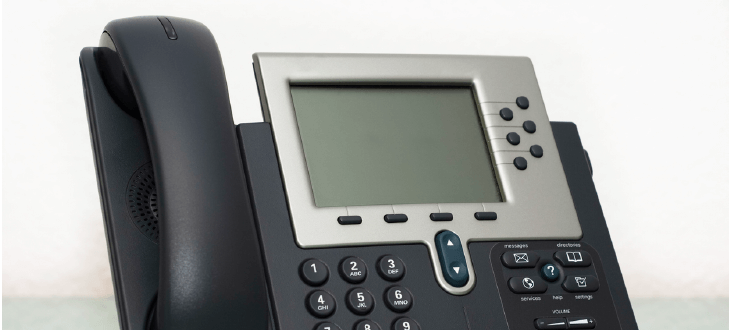
SIP hardware resembles and operates like traditional telephones. These phones connect via Ethernet cables or Wi-Fi and facilitate Voice over Internet Protocol (VoIP) communications using the Session Initiation Protocol (SIP).
Key hardware components include SIP phones, which come in desk, cordless, and conference models and provide high-definition audio and advanced call management features.
According to Nextiva, not all telephony hardware is the same; they come in basic, intermediate, and advanced models. Basic SIP hardware can be any phone, either desktop or cordless, with a simple dial pad and is used to make incoming and outgoing calls.
These basic SIP hardware devices are perfect for call centres or for customer service as they are budget-friendly and user-friendly.
Intermediate SIP hardware is more complex than the basic versions but provides more functionality. While harder to train on, they offer everything basic phones do, plus a browsable directory and multiple extensions.
Advanced SIP hardware includes all basic and intermediate features, and is typically more refined than regular phone hardware. It often includes a full-colour display, multiple extensions, and Wi-Fi or Bluetooth compatibility.
These phones may have fewer physical buttons because applications can be accessed through the display. They offer more features than basic models and are better designed, providing a more aesthetically pleasing environment for your business.
SIP telephony hardware is a fantastic, cost-effective solution for businesses, as it is cheaper than traditional phone lines. It also provides exceptional audio quality, resulting in clearer and more natural-sounding calls.
However, the downside of SIP hardware phones is that they are stationary, and as more companies move into hybrid or remote work, they become inaccessible to employees, which is where SIP calling software comes in.
SIP calling software

The SIP calling software is a crucial part of modern VoIP communication systems. It enables voice and video calls over the Internet using the Session Initiation Protocol (SIP).
You can install this software through apps on various devices such as computers, smartphones, and tablets, turning them into fully functional communication tools. For the best calling experience, you can use a headset or microphone.
Softphone offers a variety of advanced features, including high-definition voice and video calling, instant messaging, presence indicators, and integration with other business applications like CRM systems.
These applications support unified communications, allowing users to seamlessly switch between voice, video, and text, enhancing productivity and collaboration.
SIP calling software enables remote work by allowing calls from any location with an internet connection. It ensures secure, reliable communication with robust security and user-friendly interfaces.
SIP vs VoIP vs traditional phone
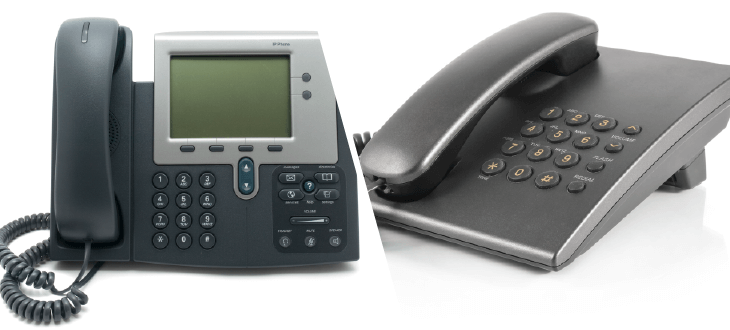
SIP, VoIP, and traditional phones are three distinct approaches to telecommunication, each with unique advantages and applications. SIP phones are a specific subcategory of VoIP phones.
SIP (Session Initiation Protocol) is a signalling protocol used within the broader VoIP (Voice over Internet Protocol) framework to initiate, manage, and terminate multimedia communication sessions, including voice and video calls, over the Internet.
SIP offers advanced features such as call forwarding, video conferencing, and integration with other internet-based services, providing a flexible and scalable communication solution ideal for businesses.
VoIP, which includes SIP, is a technology that converts voice signals into digital data packets for transmission over IP networks, offering significant cost savings, especially for long-distance and international calls, along with enhanced mobility and feature-rich communication options.
In contrast, traditional phones rely on the copper wires of cell towers to transmit analog voice signals over dedicated copper wires, providing reliable and consistent call quality but at a higher cost and with limited features and flexibility.
Traditional phones are generally tied to specific physical locations and incur higher expenses for infrastructure and long-distance calls.
What are the best SIP phone features for business?
The best SIP phone features for business combine advanced functionality with ease of use to enhance communication efficiency and productivity. Below are the best SIP phone features for businesses:
- High-definition voice quality ensures clear, natural-sounding calls, which is crucial for professional interactions and for reducing misunderstandings.
- Video conferencing enables face-to-face virtual meetings, fostering better collaboration and engagement among remote teams and clients.
- Call forwarding and routing features ensure that important calls are never missed by redirecting them to different numbers or devices, providing flexibility for mobile and remote employees.
- Voicemail-to-email functionality streamlines message management by converting voicemails into audio files sent directly to email, ensuring timely follow-ups.
- Auto-attendant features act as automated receptionists, greeting callers and directing them to the appropriate department, which enhances customer service and operational efficiency.
- Integration with business applications like CRM systems and email further improves workflow by allowing seamless access to essential tools directly from the SIP phone. These features are indispensable for modern business communication.
These features improve work efficiency by at least 67%, according to Learn.G2, and increase customer satisfaction, as employees' resolution rates of first contact with customers rise between 8% and 22%, according to Teletech.
By adopting SIP phones, your company can increase customer satisfaction. According to Salesforce, over half of customers will pay more for better service, and SIP phones can help increase sales.
What is the best SIP phone system for business?
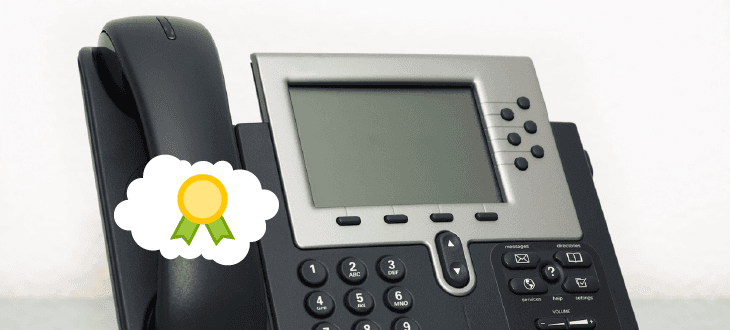
The best SIP phone systems for businesses offer advanced features, reliability, and integration capabilities to meet diverse communication needs.
It's crucial to compare different SIP phones to find the right fit for your company and ensure that your business communication needs are met effectively and efficiently.
By evaluating options, you can identify phones with high-definition voice, video conferencing, call forwarding, and business app integration.
These are vital for seamless communication and collaboration. Below are the best SIP phone systems available on the market in 2024:
- The Cisco 8800 Series is highly regarded in the telecommunications market. TrustRadius rates it 9 out of 10, and Techradar ranks it the best SIP phone system. Known for its strong performance, high-definition voice, and video capabilities, the series includes a variety of models to meet different business requirements, from standard to high-end video phones. According to IDC, Cisco maintains a leading position in the enterprise telephony market with over 40% market share, indicating widespread trust and adoption.
- The Grandstream GXP Series includes a variety of SIP phones that are tailored to meet different business requirements. Techradar rates this phone series 4 out of 5 stars. Known for its affordability without sacrificing features, these phones are well-suited for small to medium-sized businesses. They offer HD audio, customizable screen layouts, and seamless integration with Grandstream's UCM series of IP PBXs at a competitive price.
- The Yealink T5 Series comprises a range of intelligent media phones that integrate voice, video, and applications. These phones are designed for the modern workplace, offering a comprehensive feature set and high performance. The large and intuitive touch screens make it easy to navigate, reducing the time required to train staff. In addition, they come with built-in video conferencing capabilities and high-definition video quality to facilitate workplace collaboration. Yealink is rapidly gaining market share due to its combination of cost, features, and quality, making it a popular choice among SMBs and enterprises.
- The Polycom VVX Series offers a range of SIP phones designed for businesses of all sizes. These phones are known for their exceptional audio quality and feature-rich interfaces, making them suitable for standard office use and executive suites. They seamlessly integrate with leading UC platforms and business applications. According to a report by Frost and Sullivan, Poly's ongoing commitment to innovation has resulted in several industry firsts in the headset market, establishing Poly as the technology leader for professional headsets, resulting in clear, echo-free conversations.
How can a business benefit from SIP lines?

Businesses can benefit significantly from using SIP (Session Initiation Protocol) lines in multiple ways. Firstly, SIP lines provide substantial cost savings, particularly for long-distance and international calls, as they use the Internet instead of traditional phone lines. This reduces overall communication expenses for businesses with global operations. According to Tech.co, companies can save between 30% and 50% on communication costs by switching to SIP phones.
Secondly, SIP lines offer enhanced scalability, allowing businesses to easily add or remove lines based on their needs without requiring extensive hardware changes. This flexibility supports business growth and adaptation to changing demands. Since SIP lines require minimal hardware and are cost-effective, companies can expand effectively and seamlessly.
Additionally, SIP lines enable advanced features such as call forwarding, voicemail-to-email, and video conferencing, which enhance communication efficiency and productivity. As a result of these advanced features, SIP lines can increase employee productivity by up to 67%, according to Learn.G2.
SIP lines also support remote work by allowing employees to make and receive calls from anywhere with an internet connection. A FlexJobs survey found that 65% of companies using SIP phones saw an improvement in remote work capabilities.
By adopting SIP phones, businesses can enjoy substantial cost savings, scalability, advanced features, and mobility. These benefits highlight the effectiveness and efficiency of SIP phones in modern business operations.
If you seek to reap the benefits of SIP phones, obtaining professional advice from experts is crucial. At Market Inspector, we can link you with top professionals with expert SIP phone knowledge.
They will guide you in selecting the best option for your needs. By completing our quick form, you will receive four free non-binding quotes tailored to your business's requirements and budget. Click below to take the next step.
- Describe your needs
- Get free quotes
- Choose the best offer
It only takes 30 seconds

FAQ
SIP initiates, manages, and terminates voice and video calls online. It enables SIP phones to communicate seamlessly and offers advanced features such as call forwarding, voicemail, and video conferencing, making it essential for modern VoIP communication systems.
VoIP allows voice communication over the internet, while SIP is a specific protocol used within VoIP to initiate, manage, and end multimedia communication sessions. All SIP phones are VoIP phones, but not all VoIP phones use SIP. SIP phones offer advanced features such as call forwarding and video conferencing by utilising the SIP protocol.
SIP in smartphones is used to initiate, manage, and terminate voice and video calls over the Internet. It allows smartphones to handle VoIP calls, enabling call forwarding and video conferencing features. SIP turns a smartphone into a versatile communication device that supports traditional and internet-based calling.
A phone’s SIP account is a setup that enables the phone to utilize SIP for making and receiving calls over the internet. It consists of information like a username, password, and SIP server address, which validate and connect the phone with a VoIP service provider.

Caoimhe is an experienced content writer and researcher who is passionate about providing accessible information to every reader. With a background in English literature and Sociology, she combines the two disciplines to create cohesive, well-thought-out, and well-informed pieces.
We strive to connect our customers with the right product and supplier. Would you like to be part of Market Inspector?

